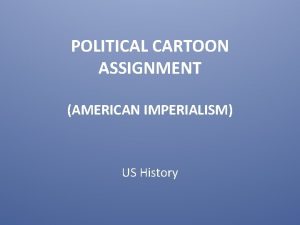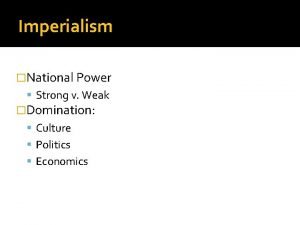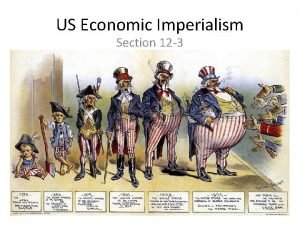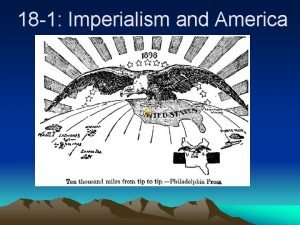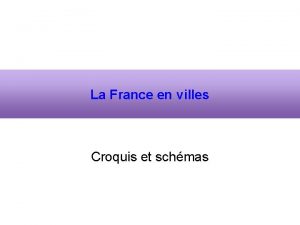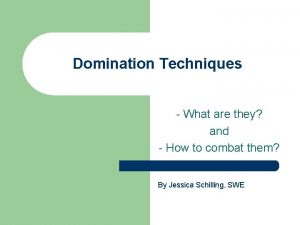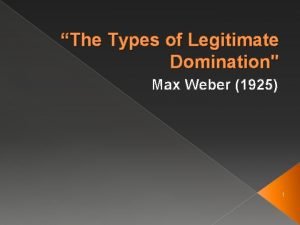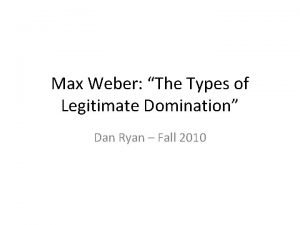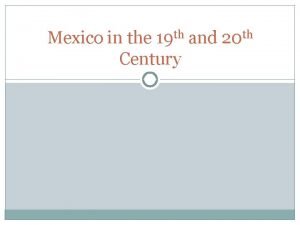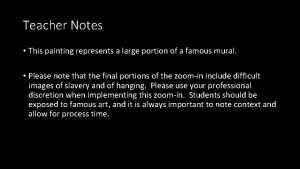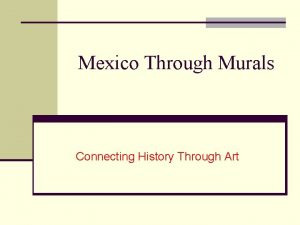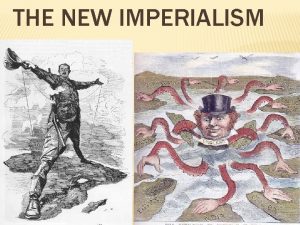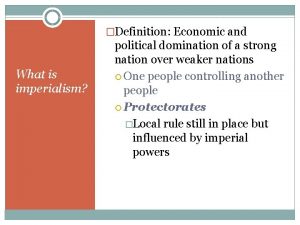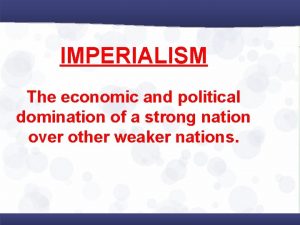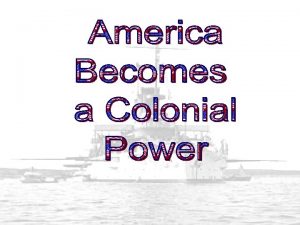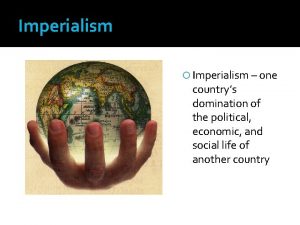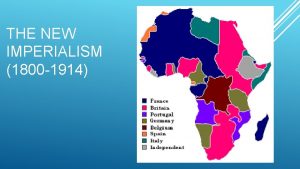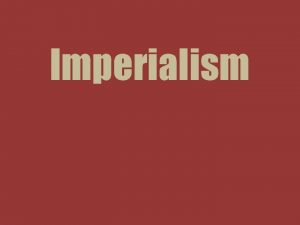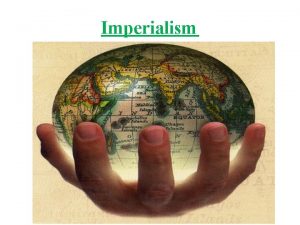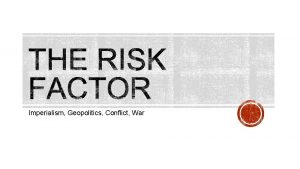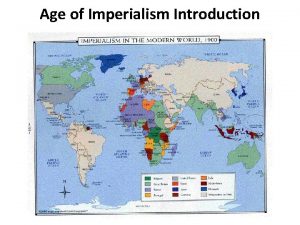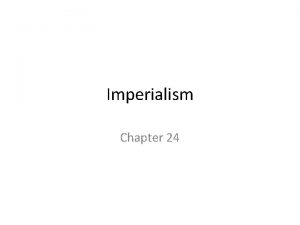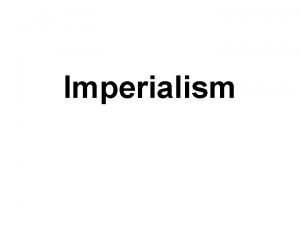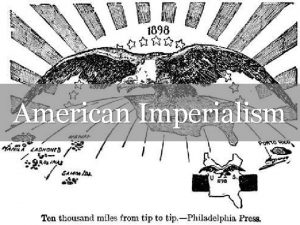Imperialism The economic and political domination of a
















- Slides: 16

Imperialism

§ The economic and political domination of a strong nation over other weaker nations Imperialism § Example – World power over developing nations

What do you notice about this map? Why is this map different from the modern map?

§ The Sun never set on which empire? § What are the two places the British colonized? Flocabulary. Imperialism Questions § What is the “white man’s burden”? § What did imperialists claim was their “mission” when they invaded foreign territories? § What religion did imperialists want everyone to convert to? § What were the two methods of transportation that were used to help colonize Africa?

§ The Sun never set on which empire? British Empire § What are the two places the British colonized? Africa & Asia § What is the “white man’s burden”? To “take care” of non Flocabulary. Imperialism Questions -white people and educate and civilize them to Western European/American standards § What did imperialists claim was their “mission” when they invaded foreign territories? To civilize and spread religion § What religion did imperialists want everyone to convert to? Christianity § What were the two methods of transportation that were used to help colonize Africa? Steamboat and train

Why would a country want to become an Imperial power?

§ In the late 1880 s, Americans wanted to become a world power, due to economic and military competition from other nations, as well as a growing feeling of cultural superiority. § Europe began to look for more places to expand invest its A Desire for New Markets capital (money) and chose countries in Asia and Africa. They began to exert control over those territories, and some become colonies, while many others became protectorates. § Protectorate- the imperial power allows the local rulers to stay in control and protected them against rebellions and invasions § Why would the Europeans allow some countries to retain local leaders? What are the advantages?

§ What is this image saying? § What do you think was the cartoonist’s purpose in creating this image? § Do you think the main idea of this image is still true?

§ America began to take notice of this expansion of European influence. America had been expanding since its creation in the 18 th century. § What are some examples of territories that America had gained since its founding? America on the Move § Why would the strategy of expanding across North America no longer work? § Indiana Senator Albert J. Beveridge- “We are raising more than we can consume. We are making more than we can use. Therefore, we must find new markets for our produce, new occupation for our capital, new work for our labor. ” § How does this idea influence our modern economy?

§ Anglo-Saxonism- English speaking nations had superior character, ideas, and systems of government and were destined to dominate the planet § What pseudoscientific theory is Anglo-Saxonism similar to? § This system of beliefs was popular in Britain and America. Anglo-Saxonism Many Americans saw it as an extension of Manifest Destiny, the belief that it had been the nation’s destiny to expand from Atlantic to Pacific. Now, they believed it was the destiny of America to expand overseas and spread its civilization and influence to others. § Imperialism was closely linked with Christian missionary work and the idea that people of Anglo-Saxon ancestry had an obligation to evangelize and civilize the people of non-white countries.

§ Commodore Matthew C. Perry led the American naval expedition to Japan to negotiate trade treaty. Four American battleships entered Tokyo Bay. It was a show of power and dominance for America as the Japanese had never seen steamships. Japan § Japan had isolationist policies, so they were not an industrialized nation like the Western world. They realized they could not compete with the industry and firepower of the West, and signed trade agreements with the US. As a result, Japan launched its own industrial revolution and built its own powerful, modern navy.

§ Hawaii’s tropical climate and rich soil led American planters to create Annexation of Hawaii sugarcane plantations on the islands. American governments pressured the Hawaiian King into deals that limited his power and increased the influence of the Sugarcane plantation owners. Sugarcane was exempted from importation tariffs, and the Hawaiian people were angry with the increased American influence on the islands. It also guaranteed the US a naval base in Hawaii, Pearl Harbor. § The Hawaiian economy was suffering when Queen Liliuokalani came to power in 1891. In 1893, she tried to reassert her power through a new constitution. § Queen Liliuokalani- last Hawaiian monarch; removed in 1893 when she tried to remove Americans from control § Planters supported a coup to overthrow the Queen, with the help of Marines.

§ On January 16, 1893, 162 US Marines marched off the warship – Adapted from A History of the American People. Boston and onto the shores of Oahu, one of the Hawaiian Islands. John L Stevens, the American Minister to Hawaii, had ordered the troops ashore. He claimed Hawaii’s ruler, Queen Liliuokalani, had created widespread turmoil and endangered American lives and property. Stevens had other motives as well. He wanted to make Hawaii, with its profitable sugarcane plantations, part of the United States. § Stevens ordered the American troops to take up positions near Queen Liliuokalani’s palace. Although, the marines took no action against the Hawaiian government, their presence intimidated the Queen’s supporters. Within hours, the American settlers in Hawaii abolished the monarchy and set up a provisional - or temporarygovernment. On February 1, 1893, at the request of the provisional government, Stevens announced that Hawaii was now under American protection, and he hoisted the American flag over Hawaii’s government buildings. Several weeks later, Stevens made his support for annexing Hawaii perfectly clear: “The Hawaiian pear is not fully ripe, ” he wrote, “and this is the golden hour for the United States to pluck it. ”

§ President Grover Cleveland did not support imperialism Opposition to Annexation and tried to restore Liliuokalani. Hawaii’s leaders waited for the next president, who they hoped would be more sympathetic. Hawaii was annexed in 1898. § Who pushed for the annexation of Hawaii- President Cleveland, American Sugar Growers, or the Hawaiian people?

§ Pan-Americanism- the idea that the US and Latin America should work together § Monroe Doctrine- written by President James Monroe in 1823; American policy that Europe should stay out of the Western Hemisphere (the Americas) Latin America § Americans were concerned that in order to defend their overseas trade deals and territories, they would need battleships to fight foreign powers. Alfred T. Mahan argued that building a navy made sense for the US, and to support this navy, the US would need to acquire more overseas bases to supply the coal needed to fuel the ships.

§ The battleship, USS Maine, floated in the harbor of Havana, Cuba. On February 15, 1898, it exploded and killed 266 officers and sailors of the 354 on board. People argued whether it was § a fire accidentally set off the ship’s ammunitions supply, Spanish American War § or if it was an enemy mine detonated nearby that set off the explosion. § Many Americans blamed it on Spain. Cuba was a Spanish colony and fighting for independence. Within weeks, America and Spain were at war and America’s position on the world stage was about to change dramatically
 Old vs new imperialism
Old vs new imperialism Causes of new imperialism
Causes of new imperialism How has the us changed from 1798 to 1898
How has the us changed from 1798 to 1898 American imperialism political cartoons explained
American imperialism political cartoons explained What is the message of this political cartoon?
What is the message of this political cartoon? Economic imperialism in latin america
Economic imperialism in latin america Direct imperialism
Direct imperialism The roots of american imperialism economic roots
The roots of american imperialism economic roots Economic causes of new imperialism
Economic causes of new imperialism Traditional legitimacy
Traditional legitimacy La domination macrocéphalique de paris
La domination macrocéphalique de paris Domination techniques
Domination techniques The types of legitimate domination
The types of legitimate domination Different types of domination
Different types of domination Colonial domination diego rivera
Colonial domination diego rivera Colonial domination diego rivera
Colonial domination diego rivera Colonial domination diego rivera
Colonial domination diego rivera


